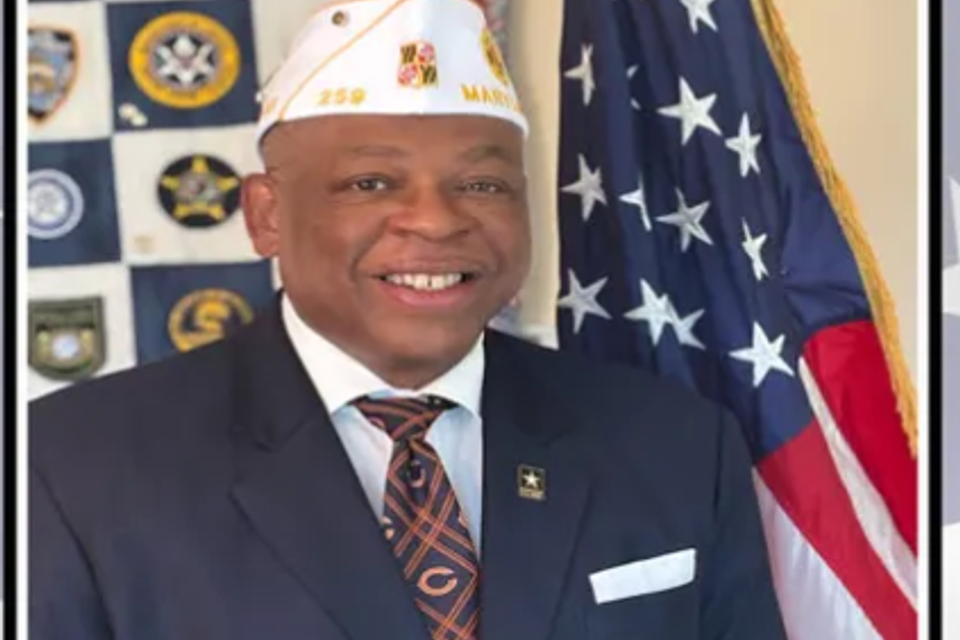
Sylvester Jones Sr.
Commander
Commander Jones was born in Chicago, Illinois. He earned a Bachelor of Arts degree from Chicago State University and later completed a Master of Science in Human Resources at the University of Maryland – University College. He is a retired member of the U.S. Armed Forces, having honorably served for 25 years and retiring as a seasoned Lieutenant Colonel (P) in the U.S. Army.
Throughout his career, he served on both active and reserve duty and is a decorated veteran of Operation Desert Shield and Desert Storm.
Commander Jones began his military service in July 1980 with the Illinois Army National Guard, joining the 933rd Military Police Company as a Private.
He was commissioned as a Second Lieutenant in December 1983 through the ROTC program at Chicago State University, entering the U.S. Army Reserves. Early in his officer career, he served as a Platoon Leader with the 138th Military Police Battalion and as a Public Safety Officer with the 308th Civil Affairs Group, both in Illinois.
During his tenure with the 308th, he and fellow unit members were assigned to augment the U.S. Army V Corps in Frankfurt, Germany. As a First Lieutenant, he supported the 11th Armored Cavalry Regiment during V Corps Caravan Guard 1989 and REFORGER 90 – Centurion Shield in Germany. In December 1990, he was promoted to Captain while serving at the V Corps Headquarters in the Abrams Complex, supporting the 8th Infantry Division.
He later transferred to the 432nd Civil Affairs Group and deployed with them to the Middle East during Operation Desert Shield/Desert Storm, serving as a Public Safety Officer in Saudi Arabia, Kuwait, and Iraq under the 18th Airborne Corps and the 7th Corps.
In 1994, Commander Jones transferred to the Virgin Islands Army National Guard, where he assumed command of the 661st Military Police Company. During Hurricane Marilyn in 1995, he led all U.S. Virgin Islands military operations in St. Thomas until civilian law enforcement resumed control. In 1998, he transitioned to the District of Columbia Army National Guard and served with the 260th Military Police Command, where he was promoted to Major and subsequently reassigned to the Mobilization Augmentation Command at the National Guard Bureau in Arlington, Virginia. There, he was promoted to Lieutenant Colonel and played a vital role in mobilizing forces for Operation Enduring Freedom in 2001.
Commander Jones later served as the S-3 Operations Officer for the 260th Military Police Command, a position he held until his military retirement in 2005. In March 2020, he received a post-retirement promotion to Colonel from Major General William Walker, then Commanding General of the District of Columbia National Guard.
Commander Jones also had a distinguished career in federal law enforcement. He began as a police officer with the Markham Police Department in Illinois, serving four years before joining the United States Marshals Service (USMS) as a Deputy U.S. Marshal in 1987, assigned to the Northern District of Illinois in Chicago.
Throughout his USMS career, he held various key leadership roles across the country. He served in the District of the Virgin Islands (1993–94), as a Supervisory Deputy in Puerto Rico (1994–96), and later as Chief Inspector in the Prisoner Services Division.
In April 1998, he became the National Program Manager for the Court Security Program and, in 1999, was selected as Acting Assistant Director for the Judicial Security Division. Later that year, he was appointed Chief Deputy U.S. Marshal for the Northern District of Georgia. In 2000, he returned to USMS Headquarters as Assistant Director of the Judicial Security Division.
On August 21, 2001, Commander Jones was officially promoted to the Senior Executive Service (SES), becoming the first African American law enforcement officer in USMS history to rise from within the ranks to the SES level. He ultimately achieved SES Level 4, the highest tier. He also became the first and only career Deputy U.S. Marshal to attend and graduate from the FBI’s prestigious National Executive Institute (NEI).
In 2004, he was appointed Assistant Director for the Prisoner Services Division—later renamed the Witness Security Division—and served with distinction until his retirement on January 11, 2014.
Throughout his military and law enforcement careers, Commander Jones has received numerous awards and honors. He is a life member of several organizations, including the American Legion, Veterans of Foreign Wars, and Disabled American Veterans. He is also a life member of the National Organization of Black Law Enforcement Executives and the United States Marshals Service Association.
Additionally, he is a proud member of Alpha Phi Alpha Fraternity, Incorporated, and a graduate of the FBI National Executive Institute (Session 34).
Commander Jones previously served for four years on the Board of Directors for the People for Change Coalition (PFCC) in Largo, Maryland, where he chaired the Public Safety Committee.
He is the author of the book "Hunting Criminals to Hiding Them: My Journey To and With the United States Marshals Service."
Throughout his career, he served on both active and reserve duty and is a decorated veteran of Operation Desert Shield and Desert Storm.
Commander Jones began his military service in July 1980 with the Illinois Army National Guard, joining the 933rd Military Police Company as a Private.
He was commissioned as a Second Lieutenant in December 1983 through the ROTC program at Chicago State University, entering the U.S. Army Reserves. Early in his officer career, he served as a Platoon Leader with the 138th Military Police Battalion and as a Public Safety Officer with the 308th Civil Affairs Group, both in Illinois.
During his tenure with the 308th, he and fellow unit members were assigned to augment the U.S. Army V Corps in Frankfurt, Germany. As a First Lieutenant, he supported the 11th Armored Cavalry Regiment during V Corps Caravan Guard 1989 and REFORGER 90 – Centurion Shield in Germany. In December 1990, he was promoted to Captain while serving at the V Corps Headquarters in the Abrams Complex, supporting the 8th Infantry Division.
He later transferred to the 432nd Civil Affairs Group and deployed with them to the Middle East during Operation Desert Shield/Desert Storm, serving as a Public Safety Officer in Saudi Arabia, Kuwait, and Iraq under the 18th Airborne Corps and the 7th Corps.
In 1994, Commander Jones transferred to the Virgin Islands Army National Guard, where he assumed command of the 661st Military Police Company. During Hurricane Marilyn in 1995, he led all U.S. Virgin Islands military operations in St. Thomas until civilian law enforcement resumed control. In 1998, he transitioned to the District of Columbia Army National Guard and served with the 260th Military Police Command, where he was promoted to Major and subsequently reassigned to the Mobilization Augmentation Command at the National Guard Bureau in Arlington, Virginia. There, he was promoted to Lieutenant Colonel and played a vital role in mobilizing forces for Operation Enduring Freedom in 2001.
Commander Jones later served as the S-3 Operations Officer for the 260th Military Police Command, a position he held until his military retirement in 2005. In March 2020, he received a post-retirement promotion to Colonel from Major General William Walker, then Commanding General of the District of Columbia National Guard.
Commander Jones also had a distinguished career in federal law enforcement. He began as a police officer with the Markham Police Department in Illinois, serving four years before joining the United States Marshals Service (USMS) as a Deputy U.S. Marshal in 1987, assigned to the Northern District of Illinois in Chicago.
Throughout his USMS career, he held various key leadership roles across the country. He served in the District of the Virgin Islands (1993–94), as a Supervisory Deputy in Puerto Rico (1994–96), and later as Chief Inspector in the Prisoner Services Division.
In April 1998, he became the National Program Manager for the Court Security Program and, in 1999, was selected as Acting Assistant Director for the Judicial Security Division. Later that year, he was appointed Chief Deputy U.S. Marshal for the Northern District of Georgia. In 2000, he returned to USMS Headquarters as Assistant Director of the Judicial Security Division.
On August 21, 2001, Commander Jones was officially promoted to the Senior Executive Service (SES), becoming the first African American law enforcement officer in USMS history to rise from within the ranks to the SES level. He ultimately achieved SES Level 4, the highest tier. He also became the first and only career Deputy U.S. Marshal to attend and graduate from the FBI’s prestigious National Executive Institute (NEI).
In 2004, he was appointed Assistant Director for the Prisoner Services Division—later renamed the Witness Security Division—and served with distinction until his retirement on January 11, 2014.
Throughout his military and law enforcement careers, Commander Jones has received numerous awards and honors. He is a life member of several organizations, including the American Legion, Veterans of Foreign Wars, and Disabled American Veterans. He is also a life member of the National Organization of Black Law Enforcement Executives and the United States Marshals Service Association.
Additionally, he is a proud member of Alpha Phi Alpha Fraternity, Incorporated, and a graduate of the FBI National Executive Institute (Session 34).
Commander Jones previously served for four years on the Board of Directors for the People for Change Coalition (PFCC) in Largo, Maryland, where he chaired the Public Safety Committee.
He is the author of the book "Hunting Criminals to Hiding Them: My Journey To and With the United States Marshals Service."
